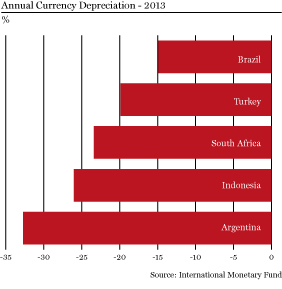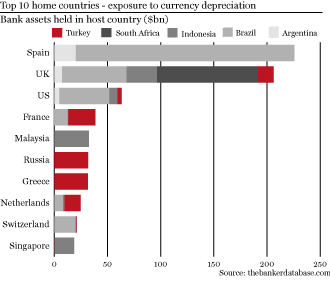Foreign banks exposed to emerging market currency hit
Currencies in several major emerging markets sold off heavily in 2013, and have remained under pressure in some cases. We look at those countries whose banks have a large subsidiary presence in the most exposed markets.
Expectations that the US would begin to tighten monetary policy, initially by tapering purchases of US bonds under the quantitative easing programme, had a profound effect on markets in 2013. One of the most marked consequences was a weakening of currencies in certain emerging markets, especially those that run significant current account deficits. Although less severe, the trend continued into 2014, aggravated by signs of a slowdown in China and local political tensions over Turkey and Ukraine.
The five largest depreciations among countries that have significant banking sectors are shown in Chart 1. Using our extensive data from foreign-owned subsidiaries in these countries, we are able to track the 10 parent banks that have the largest assets in these five markets. We can then aggregate the exposure by country.
Spain tops the list of countries whose banks are exposed to emerging market currency depreciation. This is almost entirely accounted for by Santander’s large Brazilian subsidiary, although Spanish banks also have assets in Argentina. The UK is the next most exposed, but with a much wider range of subsidiaries. Barclays has the largest presence in one of the five depreciation hotspots, due to its South African subsidiary Absa. HSBC has a large presence in Brazil, and lesser exposures in Turkey, Indonesia and Argentina. Meanwhile, Standard Chartered has significant assets in Indonesia.
Of course, emerging markets are not just the host countries for foreign banks. Their banks also invest overseas. Malaysian and Singaporean groups both invest heavily in Indonesia, while Russia’s Sberbank acquired a major subsidiary in Turkey through its purchase of Denizbank in 2012. The weakening of the rouble during 2014 should at least partly offset the exchange rate shock on the Turkish lira in 2013. For banks from smaller home markets, the effect of depreciation on total profitability could be more severe, as the foreign subsidiaries will represent a larger proportion of their balance sheet.
How these currency moves have affected parent banks will become clear once comprehensive 2013 results are available. Watch out for more analysis on this topic when we publish the 2014 Top 1000 World Banks ranking in July this year.




